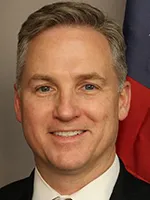Staff Reporter
Two Tort Reform Bills in Georgia Could Curb Nuclear Verdicts

[Stay on top of transportation news: Get TTNews in your inbox.]
Georgia Gov. Brian Kemp announced a sweeping overhaul of the state’s legal system in two bills introduced Jan. 30 in the General Assembly, as state trucking officials and others looked on.
“The status quo is unacceptable and tort reform is desperately needed,” Kemp declared. “Grocery stores, hospitals, road pavers, small business owners, truckers, restaurants, mom and pop stores, retailers, gas stations, doctors, child care facilities and hardworking Georgians across our state are all telling us the same thing: Georgia needs tort reform and they need it now.”
The reform package comes as Georgia’s trucking companies face mounting pressure from nuclear verdicts and rising insurance costs. The governor’s office cited a five-year increase of 25% in insurance claims across industries, with an increasing number of large claim awards over $1 million.
In one part of the tort reform that Kemp called common sense, the legislation allows a jury to know if a party bringing a lawsuit for an auto accident was wearing a seat belt at the time of the incident. “Allowing admission of seat belt evidence at trial may be used by the defense to mitigate damages, particularly where the plaintiff’s failure to use this essential safety feature results in significantly worse injuries for the plaintiff,” the governor’s office noted. This provision could impact trucking accident cases, where seat belt use often affects injury severity.
Financial damages are another area to revamp. The bill requires truthful calculation of medical damages in personal injury cases to thwart the practice of “phantom damages.” If passed, plaintiffs must show medical bills in actual amounts rather than inflated totals. Kemp noted this change will allow residents to be “made whole” in successful litigation that also protects consumers being on the receiving end of inflated passed-on costs.
The measure also protects a jury’s decision-making from irrelevant and improper arguments by lawyers to decide damage awards on their own. This could prevent attorneys from using tactics like comparing a trucking company’s total miles driven or revenue to justify higher damages.
Other reforms say liability must be established before a jury hears evidence detailing plaintiff damages so both sides can have their arguments heard. The legislation also eliminates a loophole for lawyers to be paid attorney’s fees twice for the same lawsuit and eliminates plaintiff attorneys from refiling cases to cherry pick more favorable jurisdictions.
The reforms also would re-evaluate negligent security liability to only hold business owners liable for what they directly control in keeping their property safe for customers and the public.
Kemp pointed to findings from the state Office of Commissioner of Insurance and Fire Safety, empowered by last year’s passage of House Bill 1114 (Data Analysis for Tort Reform Act), underscoring the need for changes.
“The five-year average of claims has increased 25%, much faster than the growth in our population. The percentage of cases with legal representation that awarded the full limit of the insurance policy continues to increase, far outpacing those without and the number of large claim awards over $1 million also has steadily increased,” the governor noted, adding that input was also gathered from stakeholders and others.

Kennedy
The tort reform measures (Senate bills 68 and 69) were introduced by Republican state Sen. John Kennedy, a career lawyer, and sponsored by two dozen other senators. Both bills were entered Jan. 30 and referred Feb. 3 to the Senate judiciary committee. SB 68 is called “Civil Practice” and targets substantive and comprehensive revision of civil law including evidence, damages and liability in lawsuits.
SB 69 is a nine-page bill called the “Georgia Courts Access and Consumer Protection Act” focusing on requirements and prohibitions on parties involved in financial litigation. It aims to change and bring transparency to third parties who pay to fund lawsuits. The bill bans hostile foreign adversaries from funding lawsuits as a tool to gain information about trade secrets or promote their political interests. It also protects plaintiffs from being exploited by predatory lenders who want to make decisions in lawsuits or take entire jury financial awards.
Want more news? Listen to today's daily briefing above or go here for more info
“This is a pro-Georgia consumer bill. Insurance is set up to make you whole. That’s the definition of it,” Lt. Gov. Burt Jones emphasized. “It is not a lottery ticket and too many times it’s been treated like that.”
A crowd gathered around Kemp at the state Capitol, including Georgia Motor Trucking Association President and CEO Seth Millican and two Georgia Road Team captains. They also shared trucking concerns with Kemp and other state lawmakers, “emphasizing that the time to implement meaningful changes to state laws and protect businesses and Georgians is now.”




